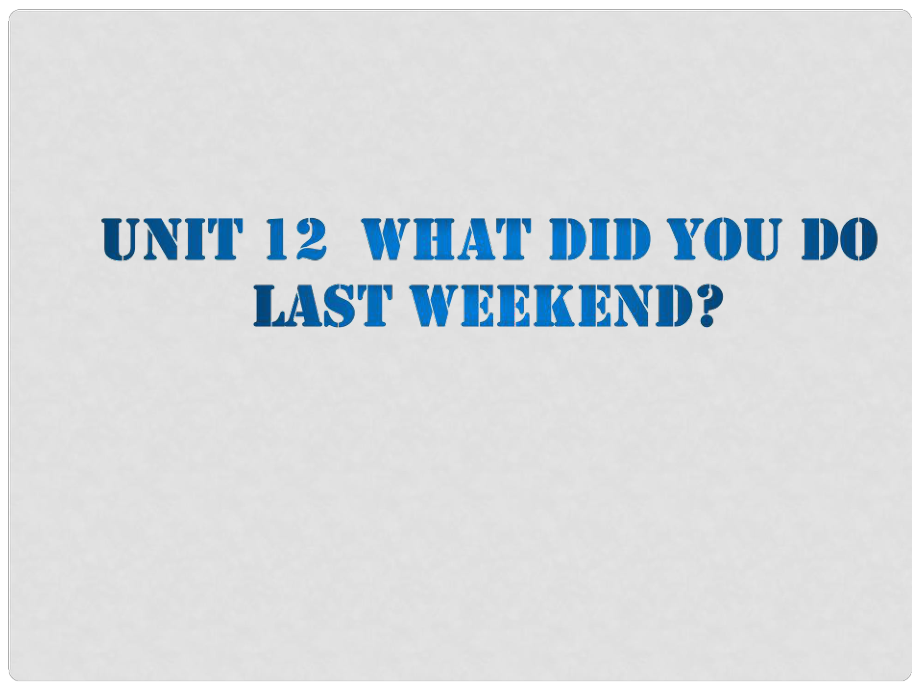《七年級(jí)英語(yǔ)下冊(cè) Unit 12 What did you do last weekend課件 (新版)人教新目標(biāo)版》由會(huì)員分享����,可在線閱讀,更多相關(guān)《七年級(jí)英語(yǔ)下冊(cè) Unit 12 What did you do last weekend課件 (新版)人教新目標(biāo)版(48頁(yè)珍藏版)》請(qǐng)?jiān)谘b配圖網(wǎng)上搜索����。
1、To learn to use simple past tense.To learn to use What questions.To learn to use Who questions. Part I Words & ExpressionsPart II Grammar FocusPart III ExercisesPart I Words & ExpressionsLets learn some new words.camplakebeachbadmintonplay badmintonsheepsheepbutterflybutterfliesvisitorsmousebabybabi
2���、esflykitefly a kitetentmoonsnakejumpforestearWordsExpressionsasprep. 作為����;當(dāng)作作為;當(dāng)作naturaladj. 自然的自然的tiredadj. 疲倦的���;疲勞的疲倦的�����;疲勞的stayv. 停留停留stay up late深夜不睡�����;深夜不睡���; 熬夜熬夜awayadv. 離開(kāi);遠(yuǎn)離離開(kāi)�����;遠(yuǎn)離WordsExpressionsrun away跑開(kāi)跑開(kāi)shoutv. 呼叫����;喊叫呼叫��;喊叫shout at .沖沖大聲叫嚷大聲叫嚷woofinterj. ( (狗叫聲狗叫聲) ) 汪汪汪汪languagen. 語(yǔ)言語(yǔ)言highadj. & a
3���、dv. 高的(地)高的(地)WordsExpressionshigh school中學(xué)中學(xué)agoadv. 以前以前Indian. .印度印度put up搭起;舉起搭起�����;舉起each other互相��;彼此互相�����;彼此surprisen. 驚奇��;驚訝驚奇��;驚訝 v. 使吃驚使吃驚WordsExpressionsget a surprise吃驚吃驚scaredadj. 驚慌的��;嚇壞了的驚慌的�����;嚇壞了的movev. 移動(dòng)移動(dòng)shout to .對(duì)對(duì)大聲喊叫大聲喊叫startv. .開(kāi)始���;著手開(kāi)始��;著手WordsExpressionsup and down上上下下上上下下wakev. 弄醒���;醒弄醒;醒wa
4�����、ke . up把把弄醒弄醒intoprep. .到到里面�����;進(jìn)入里面�����;進(jìn)入Part II Grammar Focus1. What did you do last weekend? I did my homework./We went boating.2. Who visited her grandma? Becky did.3. Where did she go last weekend? She went to a farm.4. Who did she go with? She went with her classmates.一�、一般過(guò)去時(shí)一、一般過(guò)去時(shí)1. 謂語(yǔ)動(dòng)詞為謂語(yǔ)動(dòng)詞為be:
5����、: 肯定句:主語(yǔ)肯定句:主語(yǔ)was/were其他其他. . 否定句:主語(yǔ)否定句:主語(yǔ)was/werenot其他其他. . 一般疑問(wèn)句:一般疑問(wèn)句:Was/Were主語(yǔ)其他?主語(yǔ)其他? 兩種回答:兩種回答: Yes, was����;No, wasnt. 特殊疑問(wèn)句:特殊疑問(wèn)詞特殊疑問(wèn)句:特殊疑問(wèn)詞was/were主主 語(yǔ)其他?語(yǔ)其他�? 2.謂語(yǔ)動(dòng)詞為實(shí)義動(dòng)詞:謂語(yǔ)動(dòng)詞為實(shí)義動(dòng)詞: 肯定句:主語(yǔ)過(guò)去式其他肯定句:主語(yǔ)過(guò)去式其他. . 否定句:主語(yǔ)否定句:主語(yǔ)didnt動(dòng)詞原形其他動(dòng)詞原形其他 一般疑問(wèn)句:一般疑問(wèn)句:Did 主語(yǔ)動(dòng)詞原形主語(yǔ)動(dòng)詞原形 其他?其他���? 兩種回答:兩種回答:Yes, did;
6����、No, didnt. 特殊疑問(wèn)句:特殊疑問(wèn)詞特殊疑問(wèn)句:特殊疑問(wèn)詞did主語(yǔ)主語(yǔ) 動(dòng)詞原形其他�?動(dòng)詞原形其他? My weekend was pretty good. My weekend wasnt pretty good. Was your weekend pretty good? Yes, it was./No, it wasnt. How was your weekend? She went to Beijing last week. She didnt go to Beijing last week. Did she go to Beijing last week? Yes, she
7�、 did./No, she didnt.Who went to Beijing last week?Where did she go last week? When did she go to Beijing? 二、感嘆句二�����、感嘆句感嘆句通常由感嘆句通常由what, , how引導(dǎo)�����,表示贊美�、引導(dǎo),表示贊美����、驚嘆、喜悅等感情�����。驚嘆�����、喜悅等感情���。what修飾名詞�,修飾名詞����,how 修飾形容詞、副詞或動(dòng)詞�����。修飾形容詞���、副詞或動(dòng)詞��。感嘆句結(jié)構(gòu):感嘆句結(jié)構(gòu): 1.What名詞陳述語(yǔ)序名詞陳述語(yǔ)序 Whata形容詞名詞陳述語(yǔ)序形容詞名詞陳述語(yǔ)序 What形容詞復(fù)數(shù)名詞陳述語(yǔ)序形容詞復(fù)數(shù)名詞陳述語(yǔ)序Wha
8�����、t形容詞不可數(shù)名詞陳述語(yǔ)序形容詞不可數(shù)名詞陳述語(yǔ)序2. How形容詞形容詞a/an名詞陳述語(yǔ)名詞陳述語(yǔ)序序 How形容詞或副詞陳述語(yǔ)序形容詞或副詞陳述語(yǔ)序如:如:What noise they are making! What a clever boy he is! What wonderful ideas (we have)! What cold weather it is! How clever a boy he is! How lovely the baby is!Part III Exercises一�、單項(xiàng)填空一、單項(xiàng)填空B1. Whats it? I feel something _
9����、 in the house? Maybe it is a mouse. We should keep a cat. A. move B. moving C. to move D. moves2. Its cool. Who _ the tent for us? Do you know? Let me see. It must be Tom. A. puts up B. goes into C. put up D. put in3. Where is your cousin? He _ an English exam now. A. has B. had C. have D. is having
10、AD4. did you play with? Peter. A. WhoB. Where C. WhenD. Why5. Whatdo you speak? Chinese. A. subject B. language C. thing D. peopleAB二���、用括號(hào)中所給詞的適當(dāng)形式填空二��、用括號(hào)中所給詞的適當(dāng)形式填空1. There are some(mouse) in the room. 2. English is a(two) language for us Chinese. micesecond3. We cant(hear) each other clearly in the
11����、 classroom in the morning. 4. They had so much(fun) playing badminton. 5. Mary(lose) her watch yesterday.hearfunlost三��、選詞填空三�����、選詞填空ago, tent, surprise, moon, scared, move, start, into1. She went _ the kitchen to cook some food.2. The _ circles ( (圍繞圍繞) ) the earth every 28 days.3. They came to visit Ch
12����、ina two days _.4. Do you know how to put up a _? tentintoagomoon5. She got a great _ when she got the iPhone. 6. My grandparents _ to the countryside last year. They lived with my uncle in a village. 7. She _ to learn English when she was ten. 8. She was really _ to cross the rope way.surprisemovedstartedscared
 七年級(jí)英語(yǔ)下冊(cè) Unit 12 What did you do last weekend課件 (新版)人教新目標(biāo)版
七年級(jí)英語(yǔ)下冊(cè) Unit 12 What did you do last weekend課件 (新版)人教新目標(biāo)版

